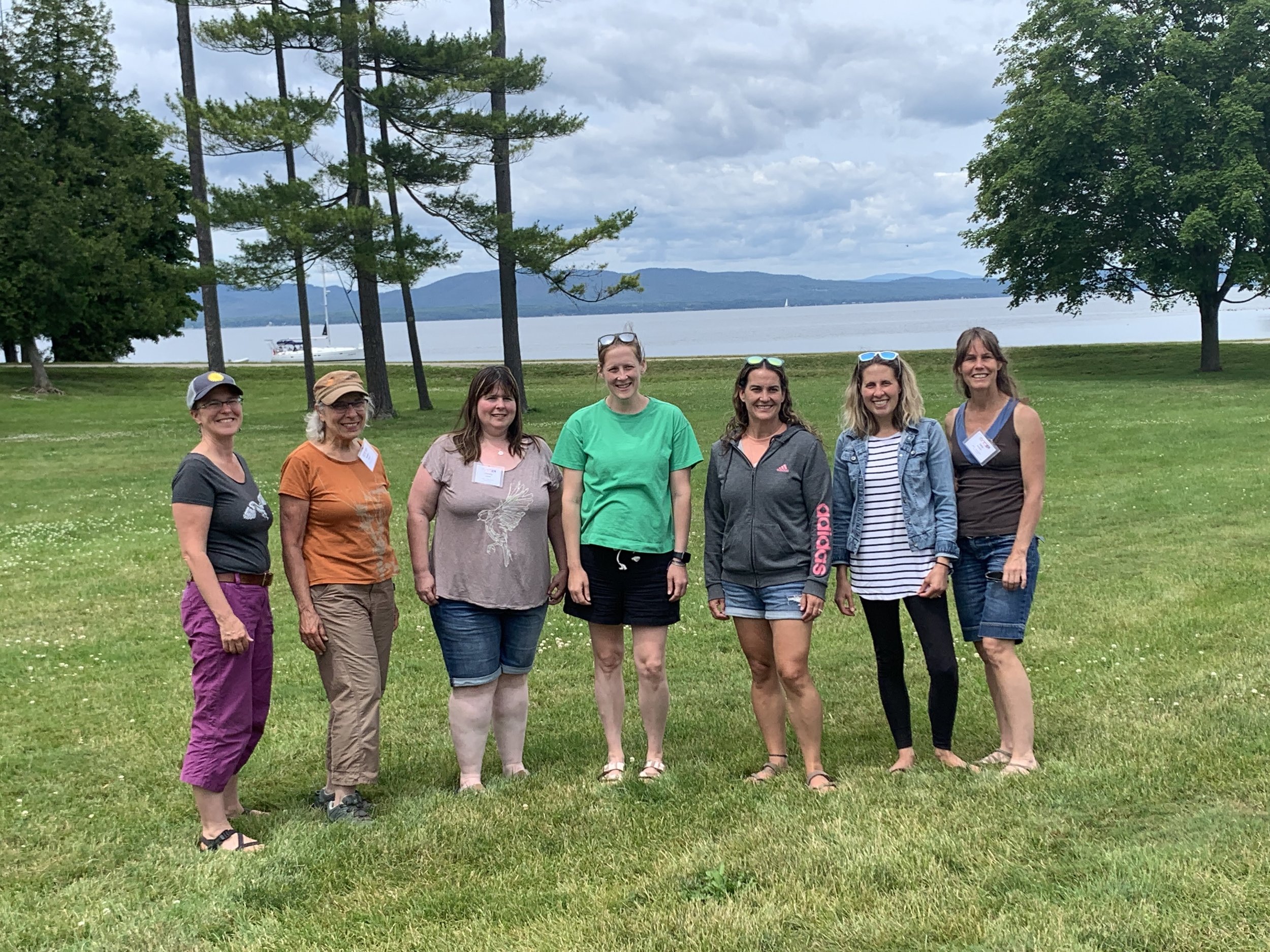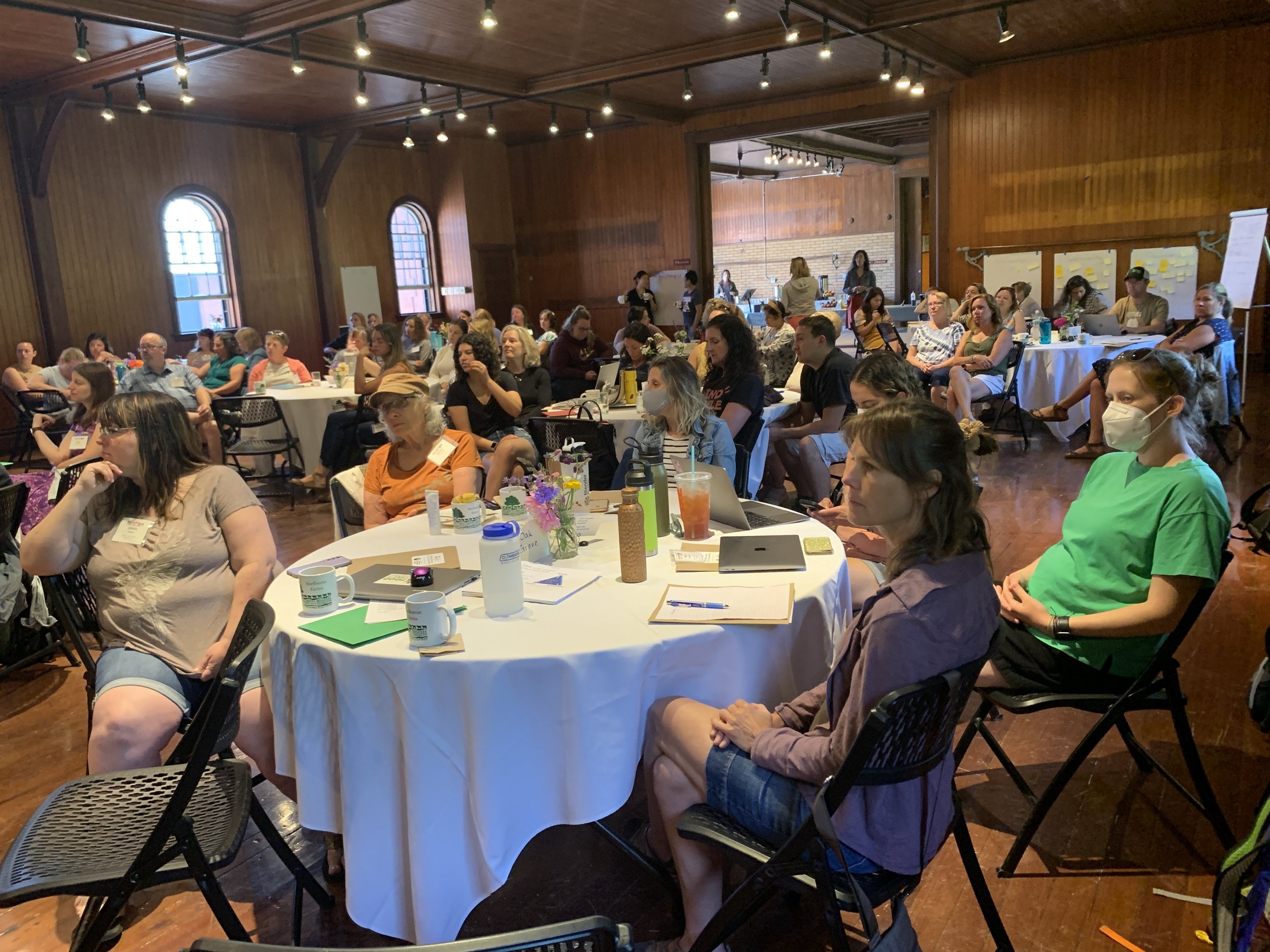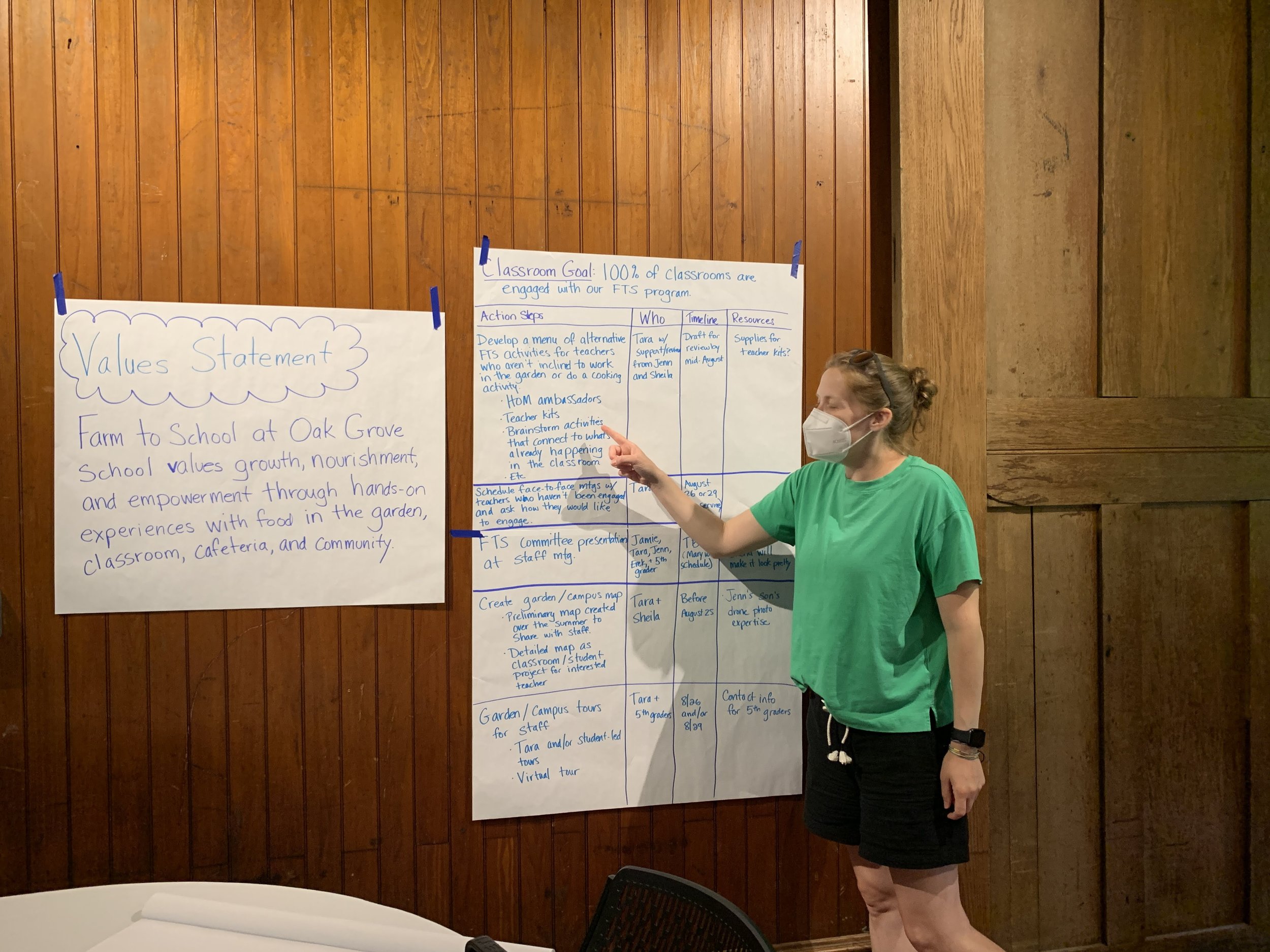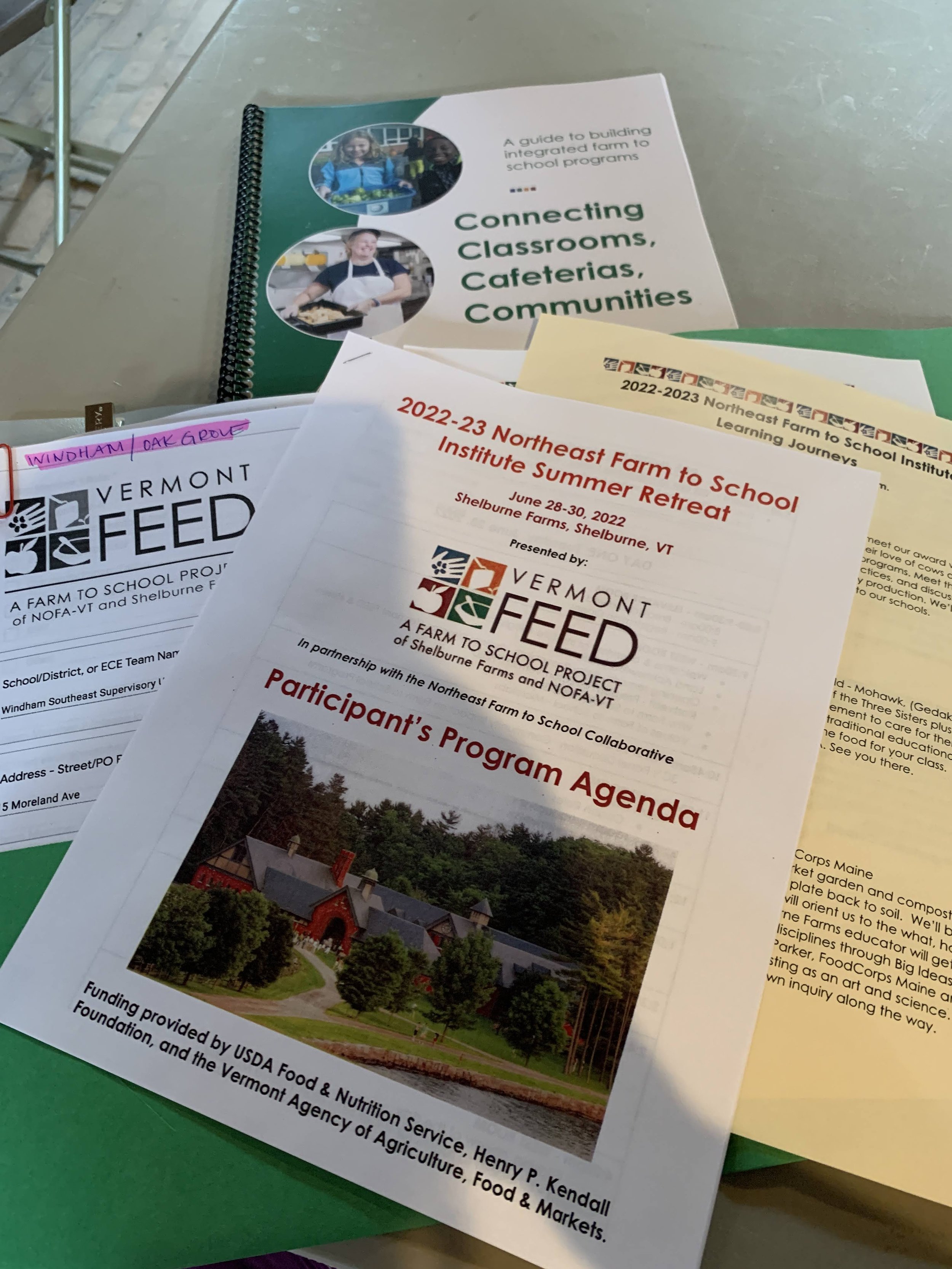Second graders from Academy School got to share their scratch cooking skills by making beautiful chocolate beet cupcakes, topped with pink frosting tinted with beet juice, for a recent Windham Southeast School District (WSESD) school board meeting. This delicious treat was just the beginning of a very special Valentine’s Day evening presentation celebrating school gardens, Farm to School programs, and outdoor education in WSESD schools.
Making Magic at Academy School
Dummerston School Launches Farm to School Buddy Class Project
By Sheila Humphreys
In the spring of 2021, Dummerston School was awarded a $10,000 Farm to School and Early Childhood Grant from the Vermont Agency of Agriculture, Farm and Markets (VAAFM). This unique grant includes customized professional development provided by Vermont FEED. At Dummerston School, principal Julianne Eagan decided to use that professional development to launch a new buddy classroom program with a Farm to School and outdoor learning focus.
Harvest Dinner Returns to Newbrook Elementary School
By Jenny Kessler
On November 9th, after two long years with very limited community events due to COVID-19, Newbrook Elementary School hosted its first Harvest Dinner since 2019. This was a beautiful event, showcasing student-made art, donations from the community, soups cooked by students, staff, and community members, a shared meal, and a successful fundraising effort for the Farm to School program. It also started with a beautiful land acknowledgment led by students.
Local Vending Machine Snacks at Brattleboro Union High School
By Sheila Humphreys
This year, the Brattleboro Union High School cafeteria has added local foods to its vending machine! Alongside more traditional vending machine snacks, Brattleboro Area Food Service Director Ali West is now stocking Brattleboro’s own True North Granola, Montpelier-based Garuka Bars, Rutland-based Sugar Bob’s Finest Kind, and Providence Rhode Island-based Shri Bark Snacks, all sourced from the Food Connects Food Hub.
Oak Grove’s Harvest Dinner: The Return of an Annual Farm to School Tradition
By Sheila Humphreys
For the first time since the fall of 2019, Oak Grove School held its annual Harvest Dinner celebration with families. A longstanding tradition at the school, this event features food grown in the school garden and harvested and prepared by students. This year, the dinner was attended by over 50 families and was held during the school’s fall open house.
Townshend Elementary Secures Funding for a Farm to School Program
In March 2022, Townshend Elementary School launched its Farm to School program, offering monthly taste tests and activities for students, focusing on the Vermont Harvest of the Month. Part-time teacher Kelsey Taddei volunteered her time to run the program with Food Connects FTS coach Jenny Kessler. By the end of the school year, it was clear that students and teachers alike really enjoyed growing their knowledge about local food. But the program needed resources to pay a Farm to School Coordinator to run programming, purchase supplies and curricular materials, and build a small garden.
Reinvigorating Farm to School at Oak Grove School
Gathering on the shores of Lake Champlain for three glorious days at the end of June, dedicated members of Oak Grove School’s Farm to School (FTS) Team immersed themselves in learning and planning their next steps towards strengthening their FTS program. The Oak Grove team is participating in the Northeast Farm to School Insititute (NEFTSI) this year. The June retreat began a year-long professional learning opportunity to strengthen FTS programming at the school. Now in its 12th year, NEFTSI is a tremendous resource for schools looking to increase the capacity of farm, food, and nutrition education to impact lasting change in classrooms, cafeterias, and the community.
FTS teams comprised of educators, food service professionals, administrators, and community members from 10 different schools and school districts in Vermont, Connecticut, Massachusetts, Maine, Rhode Island, New York, and Nebraska were in attendance at NEFTSI this year. With such a diverse group of participants, there were many opportunities to cross-pollinate ideas among rural and urban schools serving pre-K through 12th-grade students.
The NEFTSI agenda featured a mix of inspiring speakers, hands-on learning opportunities, and focused work time with the support of a coach to set achievable goals for the upcoming year. Participants were nourished by delicious meals made from recipes in the New School Cuisine Cookbook and featuring local, seasonal produce throughout the institute. Workshop topics ranged from “Bringing the Food System Alive in the Garden and Compost” to “Farm to School in the Classroom Through an Equity Lens,” giving participants multiple opportunities to engage in hands-on learning with topics of their choosing.
Oak Grove School has had an FTS program for over 15 years. Their garden program has taken a big step forward in recent years by adding a part-time garden coordinator, Tara Gordon. Recent changes to the garden include moving the primary garden beds to a more central location and adding several pollinator gardens and other plantings to their Living Schoolyard.
At NEFTSI, the team began by crafting a values statement to guide their work and explicitly communicate their values to the greater community. After reviewing some sample values statements by other FTS teams and doing some group brainstorming, the team quickly agreed on the following statement:
“ Farm to School at Oak Grove School values growth, nourishment, and empowerment through hands-on experiences with food in the garden, classroom, cafeteria, and community.”
Next, the team moved on to goal-setting. Oak Grove’s FTS program had a few setbacks during the COVID-19 pandemic, one of which was that the school-wide harvest dinner was canceled for two years, and it is unknown whether it will return in 2022. This annual harvest celebration allowed the entire school community to engage in gardening and cooking together. The loss of that school-wide activity has impacted full school participation in the FTS program. On the other hand, the pandemic has motivated some classrooms to spend even more time outdoors in the school garden than they did before the pandemic. Currently, about ½ of the faculty at Oak Grove actively engage with their students in FTS activities regularly throughout the school year. One of the goals set by the team at the Institute is to increase classroom participation in FTS back up to 100%.
With no guarantee that the harvest dinner would come back this year, the team had to think creatively about other ways to encourage classroom participation in FTS activities. The team plans to kick off this goal by hosting a garden party for school staff before the start of the school year to encourage staff who don’t usually visit the garden to step outside and eat a delicious lunch together. A simple garden map will be created before the garden party to help teachers know what is growing in the garden and where to find it. Tara hopes to partner with a classroom to engage students in making a more detailed garden map as a special project this year.
Plans are also in the works to develop a menu of creative and easy-to-use FTS lessons and activities for teachers who are not inclined to garden or cook with students and to help teachers connect these lessons to things already happening in their curriculum. Tara is available to work with all classrooms, and Principal Mary Kauffman will use the existing system of grade level accountability partners to encourage teachers to check in with a peer once a month about this school-wide goal of engaging with the school’s FTS program at least once during the school year.
That’s just one of the five goals set by the team to work on this year. Here’s a snapshot of the other four goals:
Increase student participation and reduce food waste in the fresh fruit and vegetable snack program
Bring back monthly Harvest of the Month taste tests
Increase family engagement in FTS throughout the whole year (including summer)
Increase communication about FTS to families & staff
Freshly inspired, this team is ready to continue transforming their school culture to offer more and more opportunities for hands-on learning with farm, food, and nutrition education, and we can’t wait to see the fruits of their hard work emerge throughout the year!
An Inspiring Year at Central Elementary School
Central Elementary School (CES) recently closed out a phenomenal year of Farm to School (FTS) programming, wrapping up 12 months of work dedicated to advancing food education at the Bellows Falls area school.
Selected as a participant school for the 2021-2022 Shelburne Farms Northeast Farm to School Institute, CES won a $5000 grant to jumpstart their FTS programming. While the school already had a garden and dedicated food service staff, the funding and coaching provided by the Institute helped to formalize the FTS program and integrate it more fully into the school culture and environment.
A thriving Farm to School program usually involves three key components: the classroom, the cafeteria, and the community. Often, it takes years for a school to be active in these areas, but Central’s team has grown its program from the beginning and has a comprehensive program that reaches into each of these areas.
In the classroom, Farm to School came alive in the 2nd-grade classrooms. Teachers Kate Kane and Judy Verespy worked closely with librarian Jody Hauser to devise monthly programming that included everything from art projects and read-alouds to food preparation and tastings.
In October, students harvested carrots from the garden, painted carrots with watercolors, and made informational posters about carrots before teaching other classrooms what they’d learned. Food Service Director/Garden Coordinator Erica Frank baked delicious carrot muffins for the entire school. In January, students painted with beet juice and made beet hummus in the classroom. Erica, again tying in the cafeteria, made nutritious and delicious beet brownies for the school food program.
The third “C” of successful FTS programs is community, and Central Elementary was able to connect with its community in impressive and innovative ways. In March, when the Harvest of the Month was maple syrup, the students visited a neighborhood home that ran a sugaring operation! They also tasted some “sugar on snow” made by a local (teacher’s!) family. In the spring, local farmers John and Teresa Janiszyn of Pete’s Farm Stand in Walpole, NH, visited the classroom. The farmers taught students about soil and composting, and students planted cucumber seeds. Weeks later, they transplanted these same cucumbers into the fields at Pete’s! What an amazing circular connection between students and the farmers in their communities. It has been a mutually beneficial relationship between the community and Central Elementary this school year, with each gaining and giving benefits to the other. The Rotary Club of Bellows Falls came to help with a Garden Volunteer Day and donated garden supplies. Students received gift cards to buy something at Pete’s, funded by the FTS budget.
Central’s story is one of success, but it’s only the beginning of their journey, and it has been possible through many dedicated staff members and community support. The Institute helped the team shape an action plan for their program. Principal Kerry Kenedy has supported FTS from the beginning and plans to integrate the program more deeply into the school culture over the years. One step in this process is that next year, the third grade will join the second grade in receiving monthly programming. Physical Education teacher Peter Lawry was integral in planning, building, and maintaining the garden. And Erica Frank has worked to connect the summer school program to the FTS activities throughout the summer.
If you’re curious about all the amazing things Central has been up to, please check out the inspiring book Librarian Jody Hauser made with the students.
A Thriving NewBrook Farm to School Program
This article comes to us from Amy Duffy—the new Farm to School Coordinator at NewBrook Elementary School.
“You are our sunshine!” This supportive message is displayed front and center on the walkway as students enter the new school year at NewBrook School. It set the tone for a year of learning, making connections, and sharing experiences with classmates and staff. As the new Farm to School Coordinator, it is true. The students are a ray of light.
The Farm to School Program is an immersive outdoor learning experience focusing on gardening, healthy cooking, and nutrition education. Brought to NewBrook through a partnership with Food Connects—an organization that supports educators, food service directors, and farmers in cultivating healthy farm and food connections in classrooms, cafeterias, and communities across Southern Vermont. It is nothing short of amazing.
The first three months have been exciting and rewarding. Sharing a passion for gardening and nutrition with children has always been a dream. The teachers and staff have been welcoming and willing to collaborate on bringing the outdoor classroom to life for students. Thus far this year, students worked to clean up the garden beds, spread compost, plant garlic, harvest mint and lemon balm for tea as well as save seeds to plant this Spring. Amaranth was explored as a nutritious grain that created a traditional Mexican sweet treat.
NewBrook teachers and Principal Scotty Tabachnick value outdoor learning.
First-grade teacher Ashley Moorhouse has created “Woods Wednesday,” where students take learning to the school trails. Fifth-grade teacher Joyce VanPamelen is an experienced Vermiculturist bringing worm composting into the classroom. Students regularly feed worms compost that will create soil for the gardens. Third-grade teacher Heather Sperling and staff built an outdoor clay oven where students learn wood-fired cooking methods and traditions. So far, the oven has been used for delicious wood-fired pizza with homemade dough. Fourth-grade teacher Jason Gragen is an avid fisherman and woods enthusiast who brings his knowledge of local fish and wildlife into the classroom to enhance the science experience.
Future plans include an introduction to hydroponics, microgreen cultivation, Harvest of the Month taste testing, seedling starts for the Spring garden, pollinator exploration, and a Spring Celebration. Stay tuned for more community events.
By Amy Duffy
NewBrook Farm to School Coordinator











